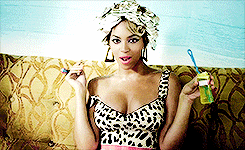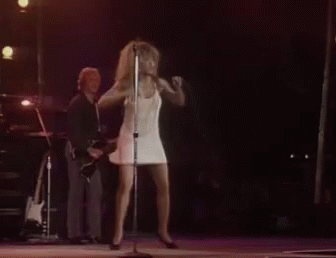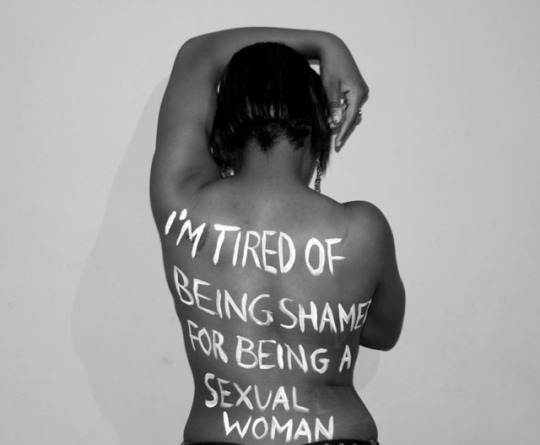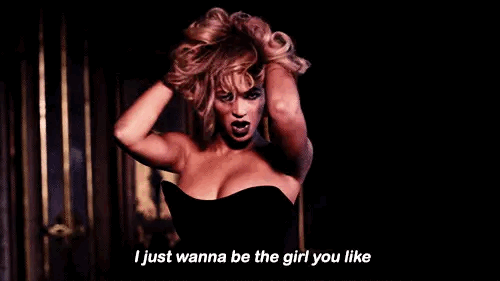"BEYONCE: MUSIC, RACE, FAME" -- a seminar about divas, popular music and black performance
Don't wanna be here? Send us removal request.
Photo

“While generating profits is a central aspect of Beyoncé’s positional power, her ability to incite cultural movements is the core of her authority. Content creator and Forbes contributor Julian Mitchell notes that part of what makes a successful commercial artist in the age of new media is their ability to captivate an audience by affecting a compelling story that is woven across media platforms. He further notes, “For artists such as Beyoncé . . . the focus shifts from simply creating cool content to designing memorable cultural moments . . . [turning] her personal messages into cultural movements that generate massive profits.” While generating massive profits is a central aspect of Beyoncé’s influence, her ability to spark movements makes her a modern organic intellectual in the classic Gramscian sense. “
Beyoncé has SO much clout that it could be seen as ridiculous. The word “flawless” is practically copyrighted by her. She has merchandise that just says the last part of her first name (YONCÉ) and people will drop some REAL money just to have that. Its not even her whole name. THAT’S how much power and influence she has and the world has just accepted it. All you have to do is a “Yoncé” to the end of a ward and people will eventually buy it until it’s sold put. She has officially march that says “HOLIDAYONCÉ” for $53. No one can ever deny that Bey has built herself from the ground up to become one of the largest cultural icons in the history of entertainment.
0 notes
Photo

"As long as young black hip hop artists continue to contest the boundaries and definitions set forth by race and class, even in politically unhealthy ways, hip hop will never achieve complete acceptance in American society." (Imani Perry, pg. 199)
I think that this is such a powerful statement that resonates with what's happening in society. There are a lot of social issues that our government is choosing to ignore completely. The president, Donald Trump, has been known to take to Twitter where he constantly calls out artists for speaking out against him with their music. Of course he wouldn't want those artists songs to rise to fame because then more and more people would hear what they have to say and might even agree. I applaud all of the young hip hop artists who aren't afraid to speak out against injustices and try to make a change.
0 notes
Text
Black capitalism
“Beyoncé performs Black southern realism and her audience accepts this performance as genuine. Zandria Robinson’s analysis of the “Formation” video hails Beyoncé’s southern realism as decidedly transgressive in its “rec- ognition of the werk [sic] of ‘punks, bulldaggers, and welfare queens’” and that, “Movements for black liberation are led by black folks at the margins who know we must all get free to sink that car.” It is plausible to suggest that, as an artist steeped in corporate music, Beyoncé’s racial performativity presents competing manifest (intentional) and latent (unintentional) functions. The last line of “Formation,” which is the nal track on the album Lemonade, gives us a glimpse into how individualism and capitalism inter- sect for her. She proclaims, “Always stay gracious, best revenge is your paper.” is closing declaration borrows the Southern female gentility trope to mask an ethic of individual economic advancement synonymous with a broader capitalist agenda. There are deeper social consequences to her use of Southern realism here, most troublingly, a false mode of Black communal liberation.” -Mako Fitts Ward, "Queen Bey and the New Niggerati" page 153
This excerpt from the reading really stuck out to me because I did not know how to form an opinion or analyze it. I agree that celebrities do say things about money and wealth without realizing that the majority of their fans are nowhere near being in the same tax bracket as them. I do think that white famous and white non-famous people talk about their generational wealth without receiving any backlash because that's just a norm in society and its what is expected. Meanwhile famous people like the Carters are scolded for praising the generational wealth they have built for their families. I do think the Carters give back to their communities and do not forget where they came from. Beyonce says it herself as its noted in the text that she is proud of her Texan, Creole and southern Black heritage. She is unapologetically herself and although her fans are not wealthy like her they can appreciate her realness and her never switching up on her roots. Beyonce has worked her butt off. She is talented and is well deserving of her success and the coins that have come with it. In formation when she says “the best revenge is your paper” to me that can me your education. Having your “paper” or “degree” is a symbol of power and represents the wealth of the mind. Being Black and educated is something to boast about in the same way that people boast about having money. Beyonce is telling us hey get that education or go out their and find your passion and use it as a tool to create success to get that paper. Beyonce is saying be gracious be humble do not forget where you came from just because you made it out and got some money. Also a lot of people doubted Beyonce a lot of critics said she would not be this successful and she is shutting them up with her paper!
--
Maddie Jones

0 notes
Text
Black Capitalism

“Style is a sign of black humanity and pride, as well as a development within black cultural practice. And an element of that style has always been excess.”- Imani Perry
The framing of this statement was very enlightening. It infers the black zeitgeist would be uplifted with the sight of another black man/woman becoming wealthy, or even an icon of sorts in the public sphere; as good style is associated with wealth. It probably goes without saying though that and individual in a community would like to see their own community bolstered, be it Puerto Ricans with Bad Bunny or Lin Manuel-Miranda, or Koreans with K-Pop stars exploding in popularity world-wide. Regarding African Americans, these shows of wealth and excess tend to be hyper scrutinized by the mainstream population as underlying racism had enveloped and continues to envelope our country to this day. Additionally, as mentioned by Perry, numerous black moguls, mainly rappers, have been stigmatized for their lavish lifestyles or gangster personas. These stigmatizations (or stereotypes) see fit that the mainstream media depicts a disparity in perception of the black community that is far from reality, effectively garnering fear in America.
0 notes
Text

"Her real middle-class economic background disrupts the performative hip hop working class Southern femininity that she presents with cornrows, initial hoop earrings, and heeled construction boots...."
This sentence stands out to me because it is a topic that has come up within my social circle. I specifically remember telling a friend that Beyoncé was very good at cosplaying as a hood girl when she is quite literally the opposite. This resulted in dialogue that wondered if it was problematic because of her middle class raising or if it was fine because she was Black. We reached the conclusion that while this is not as bad as appropriation of Black culture, it is still rooted in those same ideals. Black middle class individuals have a nasty habit of neglecting and blaming poor people for the conditions that they live in (not saying that Beyoncé does this). They insist on separating themselves from poor Black people as they clamor for the "exceptional negro" title. They do all this while using hood culture aesthetics and therefore portraying "performative hip hop working class." This is harmful in many ways, but specifically for this reading, it continues the dichotimization of classed Black femininity.
0 notes
Photo

"What's Love Got To Do With It" sung by Turner evokes images of the strong bitchified black woman who is on the make. Subordinating the idea of romantic love and praising the use of sex for pleasure as commodity to exchange, the song had great appeal for contemporary postmodern culture. It equates pleasure with materiality, making it an object to be sought after, taken, acquired by any means necessary. " bell hooks
This quote stuck out to me because of the way it is phrased. Sex is used a commodity. We all know of the expression that sex sells, but we don't often understand at what price that it costs. I often wonder the toll it takes on female (specific) entertainer s that incorporate sex into their image just because of its desirability.
However the power to harness sex as an income generation thing has always fascinated me. It takes a lot to put forth something that in society's view should be kept private. For an entertainer to display sexiness constantly takes a lot of energy and vulnerability.
0 notes
Photo

“‘Poaching’ emphasizes the process of making meaning and the fluidity of popular interpretation. To say that fans promote their own meanings over those of producers is not to suggest that the meanings fans produce are always oppositional ones or that those meanings are made in isolation from other social factor. Fans have chosen these media products from the total range of available texts precisely because they seem to hold special potential as vehicles for expressing the fans’ pre-existing social commitments and cultural interests; there is already some degree of compatibility between the ideological construction of the text and the ideological commitments of the fans and therefore, some degree of affinity will exist between the meanings fans produce and those which might be located through a critical analysis of the original story” (34, Jenkins)
Textual poaching is the process in which fans transform their diva’s persona (their art, music, and spirit) into something meaningful, and their own. Beyonce’s fans have created the Hive which is arguably the most loyal and consistent fan base network out there. It is a prime example of poaching, as it literally has built a community of people and network simply off of a shared adoration for Queen Bey. Websites, fan art, covers of songs, and stan accounts are just a few examples of the ways artists transform their fav’s into something meaningful for themselves. Poachers are constantly consuming and reworking media to become more meaningful and personal to them. Poaching also creates solidarity amongst fans, seeing as the Hive has started some of the world’s most beautiful and long distance friendships out there.
0 notes
Text
His decision to create the wild black woman was perfectly compatible with prevailing representations of black female sexuality in a white supremacist society. Of course the Tina Turner story reveals that she was anything but a wild woman; she was fearful of sexuality, abused, humiliated, fucked, and fucked over. Turner's friends and colleagues document the myriad ways she suffered about the experience of being brutally physically beaten prior to appearing onstage to perform, yet there is no account of how she coped with the contradiction (this story is told by witnesses in I, Tina). She was on one hand in excruciating pain inflicted by a misogynist man who dominated her life and her sexuality, and on the other hand projecting in every performance the image of a wild tough sexually liberated woman. (hooks 67)
I find it interesting that Tina Turner defers to her friends to recount her experiences of abuse. Understandable because she likely did not want to remember and relive that experience and present it to the world in a potentially performative fashion, but it's also a way of distancing herself from what happened, or making it seem less real to her readers. I also think that this kind of duality between private objections and public projections of identity is typical of a diva, particularly if she is interested in crafting an image that is more palatable to her audience that she can actively fine tune.

And I'm choosing this Beyoncé picture because it accurately represents all the levels my brain is thinking on when i read anything by bell hooks
submitted by emily furlich
0 notes
Photo

"Most often attention was not focused on the complete black female on display at a fancy ball in the "civilized" heart of European culture, Paris. She is there to entertain guests with the naked image of Otherness. They are not to look at her as a whole human being. They are to notice only certain parts. Objectified in a manner similar to that of black female slaves who stood on auction blocks while owners and overseers described their important, salable parts, the black women whose naked bodies were displayed for whites at soda I functions had no presence. They were reduced to mere spectacle."
This quote makes me think of Sarah Baartman, also known as " "Hottentot Venus", how was paraded around freak shows in London and Paris so that way the spectators could look at her but. The reason was that Sara had what was called "steatopygia", resulting in extremely protuberant buttocks due to a build-up of fat.On stage she wore skin-tight, flesh-coloured clothing, as well as beads and feathers, and smoked a pipe. Wealthy customers could pay for private demonstrations in their homes, with their guests allowed to touch her. She was coerced into this performances at first against her free-will.
This make me think about the objectification of black women, who are often sexualized with natural bodies that they were born with, and seen as a show for "men."
6 notes
·
View notes
Video
youtube
"The same schoolgirl innocence, in another instance, associated with sexual modesty is not extended to the ghetto girl in the urban scene that is dimly lit with hot pink subway tiles. The intensity of the hot pink background along with long shots of her booty dance suggest Beyonce´’s sexually proficiency as a ghetto girl. "
(Aisha Durham, "Check On It" p.44)
This portion of this reading stuck out to me as it draws a connection that I think needs to be articulated and made a topic of conversation more often. Within and out of the circle of people who are seeking to unlearn white supremacy and learn black womanhood, I think a topic that could use more conversation is the sexual agency that we allow black bodies to have, particularly our 'ghetto girls'. When speaking on different images of sexuality and how popular media populates those images, it's rare to see black girls come in contact with sexual modesty in urban settings. The image has been created that deems ghetto black girls as desiring to be available for sex, but not being desired to be available for sex depending on their proximity to whiteness. The concept of innocence and fragility is not really afforded to black bodies from a white gaze in any sense, so that's being translated into how we consume and interpret black sexuality. When the black body is sexually desired, it is like there is a mutual understanding of this 'exotic', high-passion, high-energy, almost ravenous rendezvous. The bolded selection words it perfectly, "modesty is not extended to the ghetto girl". This is setting the ghetto girl in the place of only wanting to be consumed and being open about it -- which can be a true, of course -- but this narrative specifically seems to exist only to limit the faceted nature of sexuality in regards to expression when discussing the black body as a sexual.
-tp
0 notes
Text
Sex Sirens
“The backwards gaze is a pornographic one. The profitable marriage between the hip hop and the adult video industries launched the porn career of Florida rapper Luther Campbell of 2 Live Crew. In the 1990s, 2 Live Crew provided the porn chic or the popular porn blueprint for the emergent lyrical and visual content in rap music videos where regional representations of the booty and the accompanying bass-heavy “booty” music eclipsed other aesthetic forms of hip hop for audiences tuned into MTV programming, such as Yo! MTV Raps (1988 – 1995). By 2001, Snoop Dogg had produced an award-winning adult film fashioned as a music video (Doggystyle). The Tip Drill music video that aired on the now defunct BET Uncut in 2003 provides an important flashpoint to illustrate the convergence of the backwards gaze with familiar tropes from pornography. After striptease and water wrestling scenes, the camera zooms to a man sliding a credit card down the bare buttocks of a woman depicted as a tip drill, a derogatory reference to a woman whose social value and sexual desirability derives from her booty only”
Sexuality in music videos have been evident over the past few decades. Throughout that time, the stereotypes with race and gender varies each decade. African Americans have been admired significantly for their unique figures and exotic beauty. Around the 1990’s, it became common to see women dressed provocatively while shaking their booties in the background of male artist music videos. Men were more likely to appear as a lead singer than woman were. Women were perceived as weak and dependent compared to men and valued for their physical and sexual appearance rather than their character. “This research suggests increased exposure to violent and sexual content adversely affects young people by creating damaging sexual beliefs, sexual scripts, race and gender stereotypes and sexual aggression.” Over time, exposure to music videos with such visuals can be very damaging to a adolescent character development. It can alter young adults perception of appropriate societal behaviors.
0 notes
Photo

“While the term “nigger” continues to incite contested meanings, many Black artists throughout the twentieth century reappropriated the term as an act of freedom, supplanting white supremacist connotations with notions of communal pride and solidarity. “ (page 148)
I think this speaks to Beyonce’s success in combination with her ambiguity. Her ability to resonate through racial and global barriers is a result of the content of her music, in addition to economic success. Money is power. Beyonce has an enormous amount of respect in the industry. Her respect as an “icon” has allowed her great agency to ultimately, write music about whatever she wants. Her unapologetic outlook on black disparities across the nation have received an outpour of love from black community, specifically black women. She strategically uses her albums to tell a story, that often served as a form of protest music, in one way or another. She takes stereotypes that often restrain women to subjective thinking, and tells it from a viewpoint that depicts positive representations of such occurrences. This stimulates conservations in hopes to eventually reach a space in society, where people are taught to think more objectively. Beyonce often uses themes that, display radical viewpoints in the narratives of her music, to give voice to issues involving, white heteronormative patriarchy in additional to racial injustices. Much like the rewriting of the word “nigger” to “nigga”, as seen today, Beyonce uses similar themes through her patterns of protest music. She uses her bodies of work, to give positive black female representation/voice in media, where they have often not been heard in the past. Her money and unified respect has placed her on a pedestal, where she has the power to exercise free agency. It is also striking that there is no doubt, that Beyonce has recognized her power. Many black artist tiptoe through the music industry, because one bad move can make or break their career. Her ability to make such controversial moves, as seen in the release of Formation, days before her performance at the Super Bowl, is ultimately evidence of such agency. Whether or not her success is a combination of her talent and capitalism, there is no doubt that her success has been positive for women and the black community. She has not only instilled hope in her fans, but has reinvented/reappropriated narratives that often seek to put down black people and women across the globe. Her music touches so many, because she speaks on black female’s plights and, pushes back against narratives that, often silence black women’s voices.
Mako Fitts Ward, "Queen Bey and the New Niggerati" (Page 148).
0 notes
Text
SEX SIREN
“…No other figure epitomizes the connections between grotesquerie, animalism, and hypersexuality [more] than the “Hottentot Venus.” The very appellation suggests competing claims of savagery and ultimate feminine sex appeal, thus eliciting both the repulsion and the allure that has shaped dominant cultural representations of black female bodies.” – Janelle Hobson
I found it interesting reading about this case of, as Hobson put it, grotesquerie. Firstly, the intrigue around Sara Baartman, or the Hottentot Venus, parallels society today as we glorify, sexualized, gawk, and essentially worship celebrity personalities with the biggest rear-ends. You could go so far as to say Baartman was a trailblazer for society today. Inversely, the analytical and clinical way Baartman was treated throughout her life for her appearance was downright abhorrent, highlighting the peak of colonial intervention and exploitation. The implications of such treatment also draw attention to an outsourcing of sexual deviancy from the Caucasian men of the time; being so comfortable criticizing a black woman’s body, that they tear her limb from limb and display her sex organs to the world.
-nv
0 notes
Photo

“Contemporary popular music is one of the primary cultural locations for discussions of black sexuality. In song lyrics, "the butt” is talked about in ways that attempt to challenge racist assumptions that suggest it is an ugly sign of inferiority, even as it remains a sexualized sign. The popular song. "Doin' the Butt," fostered the promotion of a hot new dance faVOring those who could most protrude their buttocks with pride and glee. A scene in Spike Lee's film School Daze depicts an all-black party where everyone is attired in swimsuits dancing--doing the butt. It is one of the most compelling moments in the film. The black "butts" on display are unruly and outrageous. They are not the still bodies of the female slave made to appear as a mannequin. They are not a silenced body. Displayed as playful cultural nationalist resistance, they challenge assumptions that the black body, its skin color, and shape, is a mark of shame. Undoubtedly the most transgressive and provocative moment in School Daze, this celebration of buttocks either initiated or coincided with an emphasis on butts, especially the buttocks of women. in fashion magazines. It's potential to disrupt and challenge notions of black bodies. specifically female bodies. was undercut by the overall sexual humiliation and abuse of black females in the film. Many people did not see the film so it was really the song "Doin' the Butt" that challenged dominant ways of thinking about the body which encourages us to ignore asses because they are associated with undesirable and unclean acts. Unmasked. the "butt" could be once again worshiped as an erotic seat of pleasure and excitement.” (hooks, pg.64-65)
I read ‘Black Looks: Race and Representation’ by bell hooks. This passage was rather interesting, to say the least. I agreed with everything in the reading, black women’s bodies are always under white scrutiny, always policed. The paragraph that I added above speaks about how in recent time we’ve started reclaiming policed features of our bodies in ways in which we wanted to, ‘a cultural nationalist resistance’ as she called it. Our ��butts’ were no longer a mark of shame. The thing that was ultimately interesting to me is the author who wrote this, bell hooks, is the same person who has been harshly criticizing Beyonce for reclaiming her body. Is there a way that we can acknowledge the policing of Black female bodies without re-policing Black female bodies? In a way, bell hooks is also policing Beyonce’s body. How can Black female bodies be free?
0 notes
Photo

“They are not to look at her as a whole human being. They are to notice only certain parts (62).”
A large part of what makes Beyoncé a sex icon is her paradox between innocence and sexiness: Sasha Fierce v. Texas Girl, Flawless v. Blue Ivy’s Mom. However, her sex icon status has been criticized (a lot by white feminists) for playing into the male voyeuristic experience. Because she is a black woman, Bey does not get to be seen/live in her own sexuality, it must be for someone else’s enjoyment, to fuel someone else’s sexuality. Her fame is a contradiction since she is a sex symbol and a symbol of female empowerment, you can’t be both, right?
0 notes
Text
Week 12 sex siren
“When black women relate to our bodies, our sexuality, in ways that place erotic recognition, desire, pleasure, and fulfillment at the center of our efforts to create radical black female subjectivity, we can make new and different representations of ourselves as sexual subjects. To do so we must be willing to transgress traditional boundaries. We must no longer shy away from the critical project of openly interrogating and exploring representations of black female sexuality as they appear everywhere, especially in popular culture.” (Selling Hot Pussy by bell hooks, pg 76)
I chose this quote from the text because I think it relates to Beyonce. Beyonce is known for her curvy figure and sex appeal in her music. Many critics like to say Beyonce objectifies herself by being promiscuous and sexual in her image. Beyonce controls her own narrative because she choose to show her sexual side in her music and appearance. She does not let her husband nor a record label dictate the amount of sex appeal in her work. Beyonce is comfortable in her body and her authority over what she puts out there makes her a boss. Beyonce does not put her body out there to be oversexualized. Men in the music industry can sing and rap about objectifying women's bodies all the time. Sometimes they received backlash, but people still continue to listen to their music. There is sometimes this double standard that goes on. Beyonce gets judged for being too sexy. Critics say it's inappropriate and it's not a good example for young women when in actuality teaching young girls that they cannot be sexual beings and they should not appreciate their bodies is wrong. Beyonce shows women that being sexual does not mean you are doing anything wrong and you should not be judged for it just like how men are not.

Maddie Jones
0 notes
Photo

"Black beauty pageants constitute a complex history, stretching back over a century in which black institutions variously ignored, addressed, incorporated, contested, or rejected white standards of beauty and white depictions of blacks."
I think that this is something that is so important especially in today's society. We are still seeing so many examples of how blackness is being out down or black beauty is not what society wants. the smallest things have become such a large issue and rightfully so because this is something that has been going on for so long and still continues. For example, shade range in makeup has become a HUGE demand for people because beauty brands have had a history in not providing proper shade range for different skin colors. Some brands have shades that only range from ivory to tan to medium tan and then just plain dark. THE JUMP IS UNREAL SOMETIMES. That's why this segment stuck out the most to me because this is a beauty pageant focuses on black beauty and all the beauty and colors that come with it. Why focus only on what some of society thinks is beautiful because it's "white" when that's just not how the rest of the world is. Black is beautiful.
0 notes